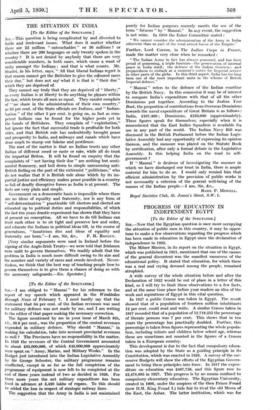[To the Editor of the SPECTATOR.]
am obliged to " Manzai " for his reference to the report of my speech which appeared in the Wimbledon Borough News of February 7. I need hardly say that the statement that 64 per cent. of the Indian revenues was used for military defence was not made by me, and I am writing to the editor of that paper making the necessary correction.
The figure mentioned by me in your issue of March 8th, viz., 38.8 per cent., was the proportion of the central revenues expended in military defence. Why should " Manzai," in making his calculation, take into account provincial revenues as well ? The Provinces have no responsibility in the matter. In 1928 the revenues of the Central Government amounted to about £95,000,000, of which £43,000,000 approximately were spenton " Army, Marine, and Military Works." In the Budget just introduced into the Indian Legislative Assembly by Sir George Schuster, the, military programme remains unaffected, except in so far as the full completion of the Programme of equipment is now left to be completed at the end of three years instead of two as decided in 1928. For three more years the net military expenditure has been fixed in advance at 5,420 lalths of rupees. To this should be added the loss in respect of strategic railway lines.
The suggestion that the Army in India is not maintained purely for Indian purposes scarcely merits the use of the term " fatuous " by " Manzai." In any event, the suggestion is not mine. In 1919 the Esher Committee stated :
" We cannot consider the administration of the Army in India otherwise than as part of the total armed forces of the Empire."
Further, Lord Curzon, in The Indian Corps in France, made the matter very clear when he remarked :
" The Indian Army in fact has always possessed, and has been proud of possessing, a triple function—the preservation of internal peace in India itself ; the defence of the Indian frontiers ; and preparedness to embark at a moment's notice for Imperial service in other parts of the globe. In this third aspect, India has for long been one of the most important units in the scheme of British Imperial defence."
" Manzai " refers to the defence of the Indian coastline by the British Navy. In this connexion it may be of interest to compare India's expenditure with that of alt the other Dominions put together. According to the Indian Year Book, the proportion of contributions from Overseas Dominions towards the naval expenditure of Great Britain is as follows : India, 1167,400 ; Dominions, £250,000 (approximately). These figures speak for themselves, especially when it is remembered that the East Indies Squadron is available for use in any part of the world. The Indian Navy Bill was discussed in the British Parliament before the Indian Legis- lative Assembly had any opportunity of expressing its opinion thereon, and the measure was placed on the Statute Book by certification, after only a formal debate in the Legislative Assembly. Is this helping India on the road to self- government ?
If " Manzai " is desirous of investigating the manner in which we have discharged our trust in India, there is ample material for him to do so. I would only remind him that efficient administration by the provision of public works is not necessarily a criterion of the general well-being of the masses of the Indian people.—I am, Sir, &c., BASIL P. HOWELL.
Royal Societies Club, St. James's Street, S.W. 1.










































 Previous page
Previous page